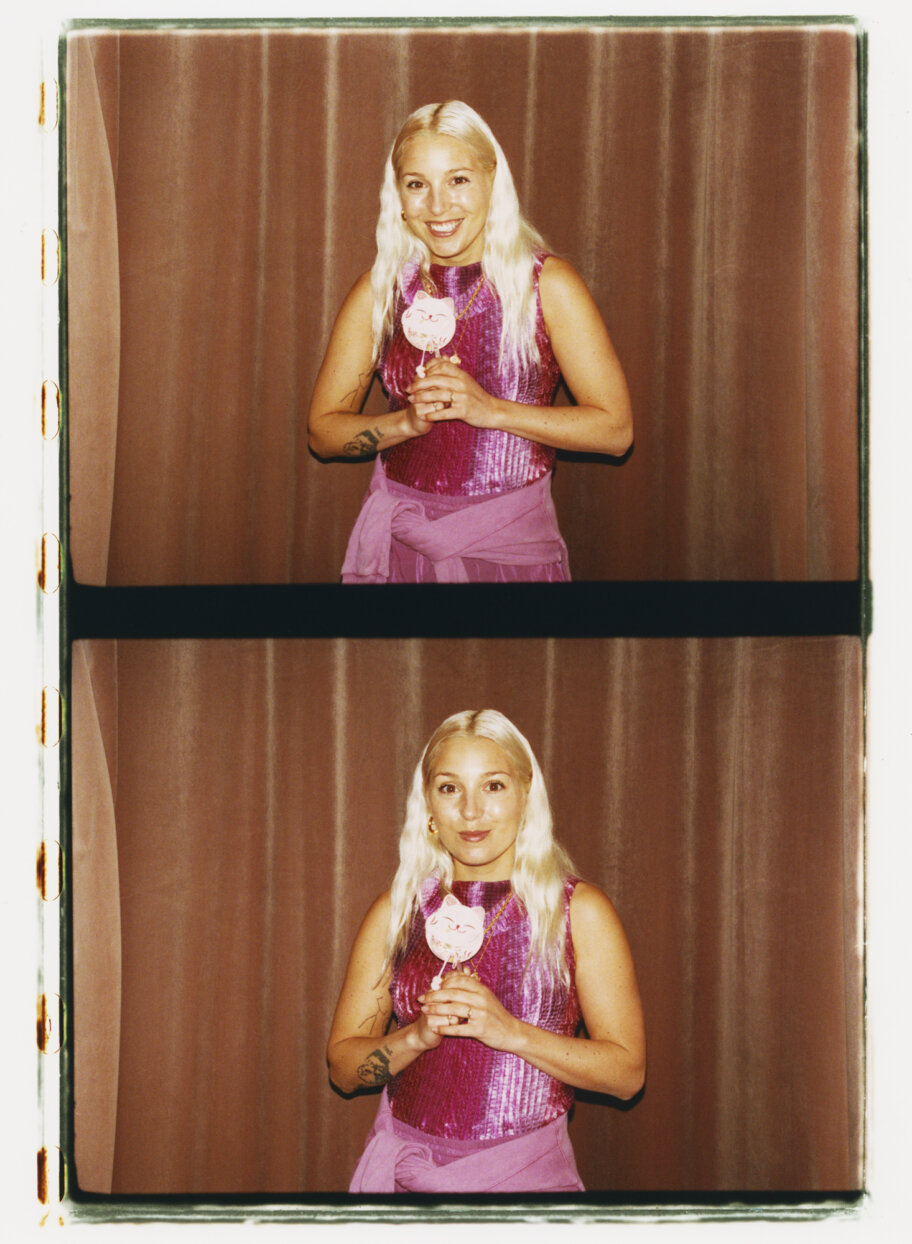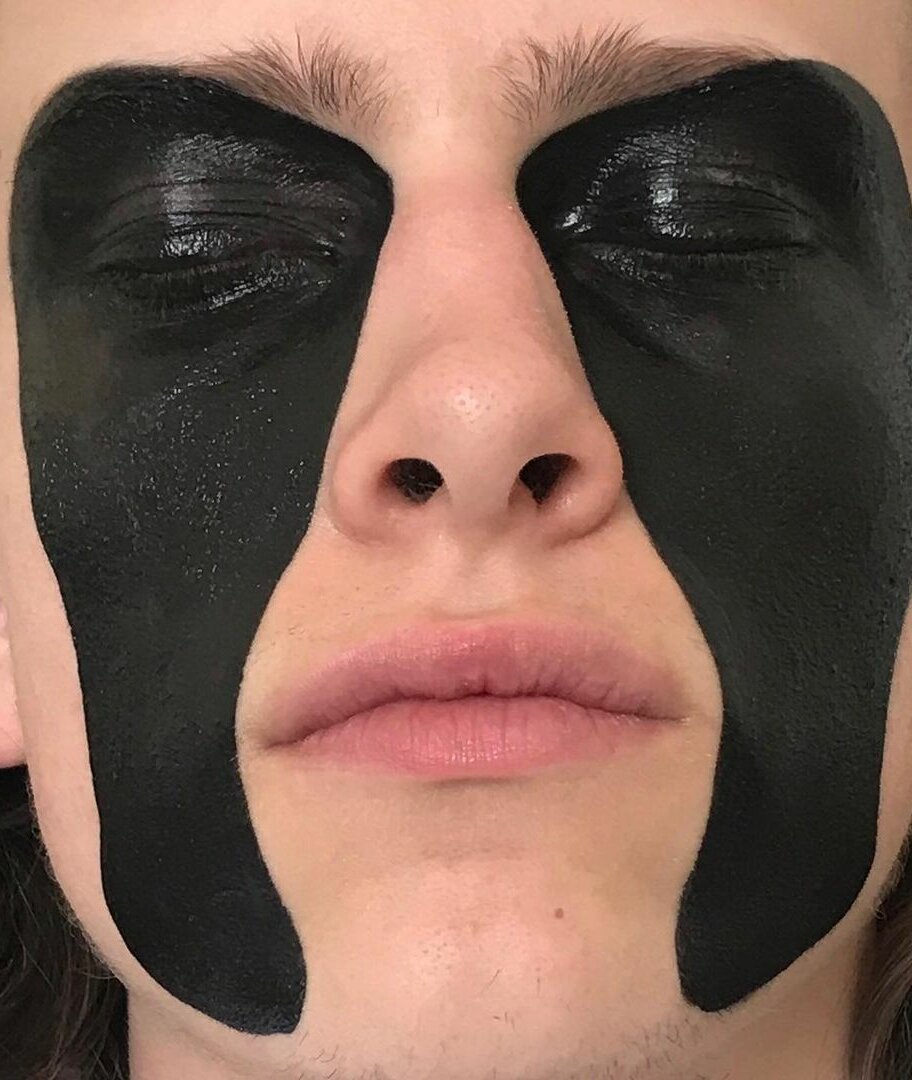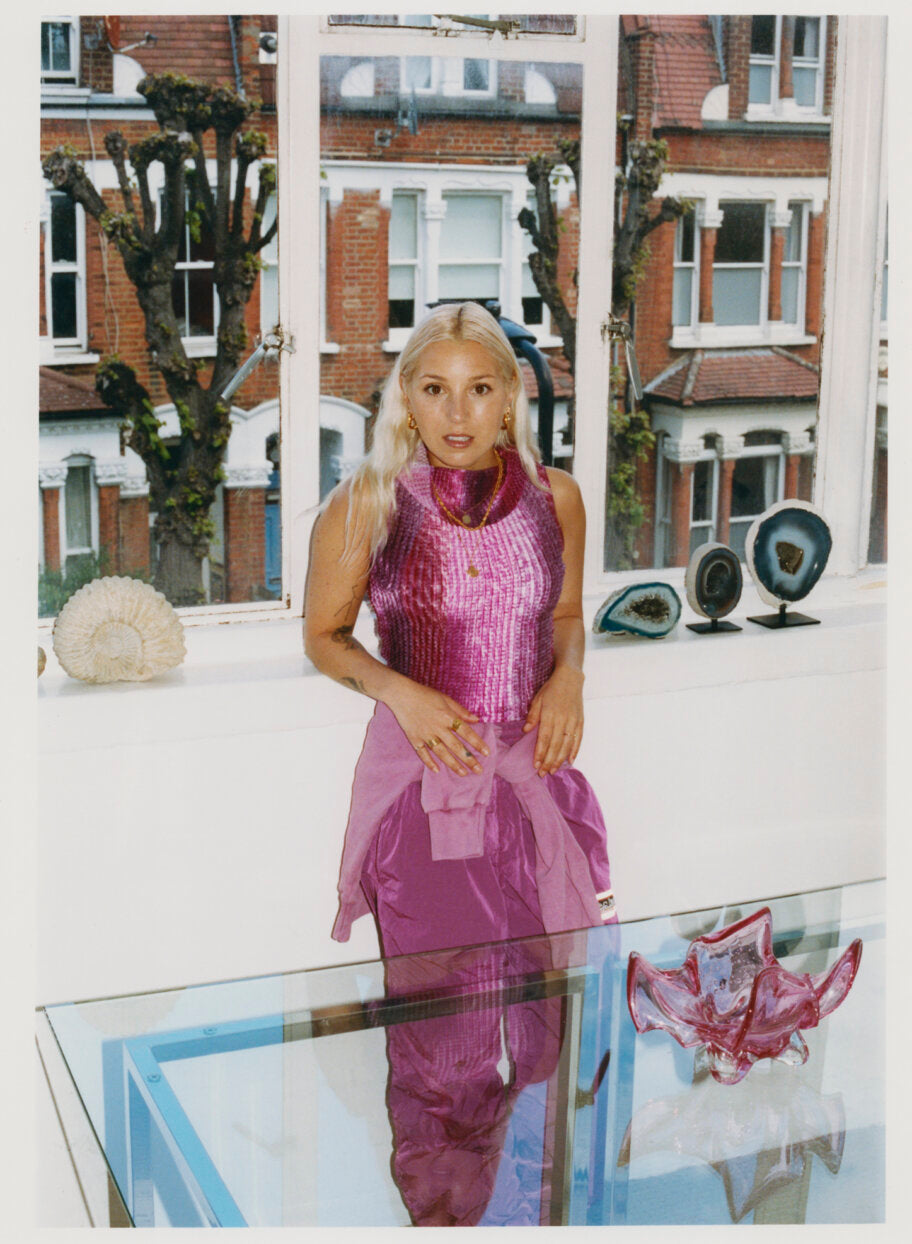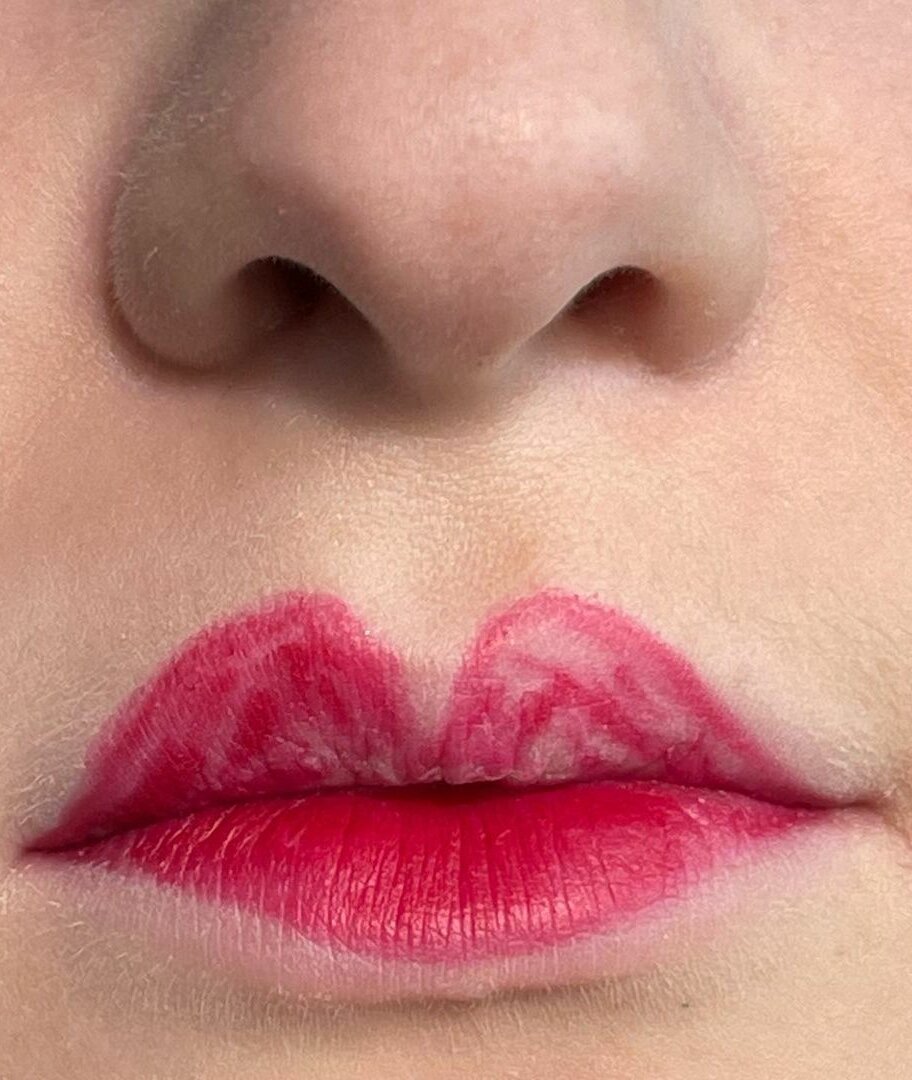
PHOTOGRAPHY WILL GRUNDY @williammichaelgrundy
INTERVIEW KIRSTINE ENGELL @kirstineengell
PHOTOGRAPHY ASSISTANT NIKOLETA MARTJANOVA @martjanovaniko
What inspired you to jump on the fashion train as a makeup artist?
For me the world of Makeup happened by accident! I studied Graphic Design at Uni, and while I was finishing my studies, I got into a weekend job. It’s very popular in Portugal to work during the weekend to get some extra cash while being a student, so I took a weekend job at L’oreal where they would cut and dye my hair. While I was there, on the 2nd day, the models started to stress as they needed to get on stage with hair and makeup done. There was a delay on the makeup, so the girls started doing their own makeup, and one of them started to panic and cry, when she realized that, not only did she not know how to do makeup, but she also didn’t have any make up with her! I tried to calm her down, and while I was doing it, the makeup artist at the job looked at me, and said “Do you think you are able to apply her makeup? I’ll pass you the products, tell you where to do it, and you apply.” I told her that I could try, so she passed me the right products and told me where to apply them. By the end of the day she asked me if I wanted to be her assistant! For over 6 months she called me every month asking if I would be interested in taking a course. At the time, my parents were divorcing, and facing that reality I didn’t have the courage to ask my mum to pay for another course as she had already given me a Graphic Design course in Lisbon. As I am a countryside girl the expenses are high when moving cities, so I avoided it for a long time, until one day, my mum was at my house in Lisbon, and the makeup artist called me again to tell me that a really good fashion makeup course was about to start in a few months, and to ask whether I was interested in doing it. I think my mum saw how excited I got about it, and she didn’t blink when she said “Do it!”. We didn’t discuss it any further! When I did my makeup course I was very lucky, as the teacher was from the fashion industry and had great experience in teaching the creative aspects in fashion and about backstage etc. Absolutely fascinated by it, and with my background in Arts and Graphic design I could see my future work in fashion. I am very conceptual in my work, and fashion was the place for it!
Being from Portugal, how was the process of getting signed and discovered in London?
It was long, but extremely rewarding! I would do it all over again if needed. The journey is a lesson itself, where learning and growing is part of the process. There is definitely trial and error, but it’s an unbelievably fulfilling feeling. It’s a process of starting from ZERO, even when I was already a makeup artist in Portugal, and having a good list of clients. When I first arrived it was tough. I had no family around, no connections, no contacts, no jobs, no agenda, no schedule – but I was very excited for the future! I barely spoke English when I first arrived. In fact, English has been the only class I ever failed in school, so coming to London was a learning process starting from the language barrier, which with time I overcame. I always said to my friends “if London fails, at least I will bring the British language home!”. I am one of those people who likes to set goals and achieve them. Language was one of them, even though I am still perfecting it. The next goal was a part-time job to pay my bills while assisting, then going freelance by myself. This is where everything really started to take off and I began to be noticed. As you mention it, I came from Portugal where makeup was then (10 years ago when I moved) very classic. There wasn’t room to play and be original, so my goal in London was to work towards being original and experimental with makeup, make it “me”, my version of makeup. I remember when Streeters first got in touch with me. It was from the New York office. I had a lovely meeting, and I understood that my book wasn’t quite ready for them, so the following years I focused on editorials and on connecting to the right people, in order to be inspired and upgrade my book. One day, finally, I reached my dream: Streeters took me in and it has been super breathtaking to be able to work with incredible artists and high-end brands. Plus my agent is a dream!


How did you develop your skills and style – Is there something particular that represents your work aesthetically and has that changed throughout your career?
I like to think of my work in an evolving style. I believe that as an artist you are always growing and evolving. Of course there will be a characteristic that makes it me, but essentially I like to explore, to be challenged, to be experimental and have no limits for what I do. But yes, there was a moment in my career where I was obsessed with iridescent glitter and glitter dust. I still am! I think it was when instagram started back then, and I was lucky to explore a lot of looks with iridescent and gloss, which was something that wasn’t too popular, as those kinds of materials were mainly sold in pro makeup shops. It was a lot of fun. When I created a bridge between art and commerce, where the looks were wearable, but still artsy, I had a lot of brands approaching me for that aesthetic.
Painting faces and using makeup goes way back in history – However you always seem to break through with new and tasty looks – where do you get your inspiration from and keep it rolling creating new characters for shows and on set?
Yes it does, in fact, it goes back as far as the primitive era, where makeup was used as a medicine, as protection against the sun and to class different individuals in a tribe, like the one in charge of the tribe, or the healer, etc. My inspiration comes naturally, sometimes I close my eyes and I just have a vision that I would like to try. Sometimes it works, sometimes it doesn’t. I am also a very sensitive person and very intuitive. Sometimes I have a model in front of me and I just feel that I should do this or that. Also my graphic design background gave me a lot of visual culture, so I guess it’s a mix of being me, my background and my visual culture.
We know you’re a born and bred glitter girl by heart. Do you find yourself in a limbo being a patsy for colorful makeup looks when it often doesn’t go hand in hand with being sustainable?
Regarding sustainability I am very aware that it’s an extremely sensitive topic. We have to bear in mind that what is sustainable now might not be in 2 years if 9 billion people decide to consume the same thing all at the same time. I do think that the brands have a responsibility to present their products in a sustainable way, but also should keep changing the way they do this and deliver products tailored to how sustainability is constantly changing. I think when you’re young, you don’t think about sustainability (or at least young people 10 years ago). I didn’t while I was in my twenties. I was obsessed with glitter! And I experimented a lot with glitter. There are brands now making sustainable glitter. It’s the very beginning of this new era, so I look forward to seeing in the future what brands can achieve with this “limitation”.
What makeup product is a must have in your kit as a professional makeup artist, and/that you wish for was sustainable?
A must have as a professional makeup artist is definitely an infinite range of foundation colors. It’s mandatory as a professional makeup artist to have an inclusive kit. I wish that all my makeup was sustainable, which we are slowly working towards.
Are you conscious of creating a sustainable environment on set when you can?
Absolutely, I have changed my kit not only because of COVID-19 but definitely also to make it more sustainable, and I am more conscious of what I use and throw away. I try to use less and replace it with other things that I can re-use. Of course it’s a challenge, because of single use as COVID demands, but there are ways around it, yet archivable.
If you’d have to share something you truly stand by and want to pass on to the new generation of budding makeup artists, what would it be?
Dream! When you dream, you are working on building your path for your dream, until one day you can walk on it!
Outside of the fashion and beauty industry, what is one thing that would surprise people about you?
Maybe that I used to ride horses professionally and do show jumping! I am a proper countryside girl. I had a farm, with about 20 or something more horses, cows, pigs, chickens, ducks, etc.
With all that you’ve accomplished, what are a few things that you still want to accomplish?
I think that there are ALWAYS things to archive, whatever I accomplished so far has been the tip of the iceberg. There is still space to learn and evolve. It’s a lifetime learning and working condition.

These days, society and social media can make a lot of us feel like we’re expected to live up to an impossible self-image. How do you think social media has affected our societal ideals of beauty?
I have a love affair with the Ancient Greek ideal of beauty. The concept of beauty by the Greeks was about the balanced and harmonious proportion of facial features. It appealed to a rational notion of beauty, where mathematics was the basis of it, thus, the perfect face would be divided into three parts:
One was from the hairline to the eyes;
The other from the eyes to the upper lip;
And the last, from the upper lip to the chin.
The width of the face should correspond to two thirds of the total height; this was the ideal of symmetry and proportionality. For the Ancient Greeks, there are certain physical aspects that were considered beautiful: a straight nose, a slightly enlarged forehead, perfect eyebrows forming a simple arch above the brow bone which joined in the middle and above the nose, and the mouth with the lower lip slightly fuller than the upper one, naturally reddish, and a round and smooth chin, without any depression. One Greek word for “beautiful” – hōraios – from the Koine dialect comes from another word which means “hour” / moment. Beauty was thus associated with “being of one’s right hour”. That is, it was not considered beautiful for a young woman to try to look older, or for an older woman to imitate a younger woman. In Greek, the word beautiful also had other meanings, such as beauty, “youth” and “old age”. The first idea of a theory of beauty appears in several works of Greek philosophers such as Pythagoras, who linked mathematics and beauty. The Greeks were great lovers of physical beauty, but always with it linked to the idea of inner beauty, that is, to the goodness of the spirit, to honesty, to what is truthful.
For Plato, beauty was an idea above any other idea, and he considered the beautiful a natural manifestation of the good, of perfection, and of what is true. While Aristotle related the beautiful with the virtue saying “the virtue aims at the beautiful”; however, later, he made a distinction between the good and the beautiful, arguing that beauty is a human creation. The Greeks appreciated simplicity, and that natural characteristics were kept true and pure, and therefore, they thought that being pale was beautiful, so giving much importance to their appearance, and having very high standards regarding beauty. They didn’t try to cover up certain aspects that were less beautiful, but yet improve their natural characteristics, since being beautiful did not always mean being kind, or good, since beautiful had to be a “kind of virtue”. For the Greeks, beauty was a gift, an offering from the gods, a blessing, where the perfect exterior would have to correspond to a beautiful mind, therefore, also too perfect inner beauty.
With that said, I think that we still live with the Greeks’ physical beauty standards.One thing that social media took away, was the opportunity of showing your inner beauty. It’s all about the looks! But the looks are relative. On one hand, we don’t talk about why attractive people are more successful. There’s no doubt that the majority of the people who have the most followers are some of the most beautiful people on earth. And with beauty follows money, so, when we look at these beautiful people, they are often wealthy, because their beauty brings them wealth. They end up pursuing even more beauty with surgical procedures and give us the type of ideal beauty that most of us can’t achieve. This reveals some harsh realities about differences between social classes, but also shows us that if you are gifted with beauty, you are likely to be more successful.
On the other hand, living through social media, beauty dissociates from reality. Somehow we are denying reality when we portray beauty on social media. We dissociate from our own body, our own image. How many times do I use a filter to erase a few wrinkles or patches of color that I don’t feel comfortable with! It feels to me like those filters teach you not to grow up, to not accept yourself. And the worst part is, we end up running away from reality. It’s unhealthy and not real. Social media creates an option for us to not grow older, to not accept the body and our own image the way they are. It feels like we’re having a dream while on social media, but when we wake up the harsh reality hits, and you get even more addicted to social media, because fantasizing and feeling cute on a filter feels better than reality.
| Cookie | Duration | Description |
|---|---|---|
| cookielawinfo-checkbox-analytics | 11 months | This cookie is set by GDPR Cookie Consent plugin. The cookie is used to store the user consent for the cookies in the category "Analytics". |
| cookielawinfo-checkbox-functional | 11 months | The cookie is set by GDPR cookie consent to record the user consent for the cookies in the category "Functional". |
| cookielawinfo-checkbox-necessary | 11 months | This cookie is set by GDPR Cookie Consent plugin. The cookies is used to store the user consent for the cookies in the category "Necessary". |
| cookielawinfo-checkbox-others | 11 months | This cookie is set by GDPR Cookie Consent plugin. The cookie is used to store the user consent for the cookies in the category "Other. |
| cookielawinfo-checkbox-performance | 11 months | This cookie is set by GDPR Cookie Consent plugin. The cookie is used to store the user consent for the cookies in the category "Performance". |
| viewed_cookie_policy | 11 months | The cookie is set by the GDPR Cookie Consent plugin and is used to store whether or not user has consented to the use of cookies. It does not store any personal data. |